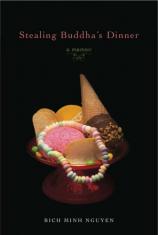Stealing Buddha's Dinner
Review
Stealing Buddha's Dinner
A wrought-iron plate beneath the statue of Buddha always held neat mounds of tantalizing fresh fruit. Buddha never partook of those offerings. Bich Minh Nguyen's grandmother, Noi, gave the perfect pears and peaches to Bich (pronounced "Bit") and her older sister, Ahn. It was a daily ritual for Noi to peel the fruit and slice it into symmetrical pieces for them; Bich found comfort in this little routine.
The author and her family fled Saigon by ship on April 29, 1975, the very day Saigon fell to the Communists. Bich's mother was not at home when the family made their hurried motorbike trip down to the docks, and she was left behind. Eight-month-old Bich, Ahn, their father, Noi, and three uncles arrived in America and settled in Grand Rapids, Michigan, along with 4,000 other Vietnamese refugees.
This is the story of a young girl living in several conflicting worlds at once. Her home life consisted of Vietnamese foods, language and customs, while the outside world was fast-paced, foreign and fascinating. Then there was the world of television, where Bich found enlightenment, entertainment and escape. The commercials amazed her, and she craved foods such as Pringles, Doritos, and Kraft Macaroni and Cheese, which she believed would make her "more American."
At school Bich stayed in the background. She earned good grades and was on her best behavior, which she hoped would keep her from being noticed. She retreated into the world of books and longed to have what she considered a normal life. She always compared herself to her classmates and was unhappy with the differences. They lived in a world of Toll House cookies; hers was of green, sticky rice cakes.
Bich longed to fit in. But in a midwestern town of mostly fair-skinned people of Dutch descent and Protestant beliefs, this tiny, bespectacled Asian child didn't blend in. Her father married Rosa, a Latino, and added an older stepsister, Chrissie, to the family. Chrissie was streetwise and incredibly cool. Then Rosa and Bich's father had a son, Vinh, of whom Bich was very protective.
The household was crowded and noisy, and family life was complicated. Rosa was a kind, no-nonsense woman who enforced rules but had little time to teach Bich social skills such as table manners. Bich's father worked long hours, then partied with friends. Ahn and Chrissie teamed up and discouraged Bich from tagging along. Noi, who spoke little English and rarely left the house, was the one constant and comforting presence in Bich's life. Her uncles worked hard, and came and went as they pleased; she was jealous of their independence.
Bich pretty much had to figure out things for herself. What she saw and experienced outside her home confused her because it was not what she was accustomed to. Her schoolmates' mothers stayed at home (while Rosa worked full time) and kept immaculate, orderly houses. They made casseroles and food that (unlike what was advertised on television) did not come out of a box. Her schoolmates wore name-brand clothing and had their own rooms. How different this was from Bich's home. She smuggled contraband snack foods up to her top bunk or to Noi's closet where she read and ate in peace. Books were an important escape from her continual loneliness; she hoped to read her way out of Grand Rapids.
Bich's mother is rarely mentioned. The family briefly heard from her when Bich was in fifth grade, but they did not reunite until Bich was in college. By being abruptly removed from the country and culture of her birth, as well as from her mother, Bich constantly experienced a feeling of what she referred to as "missingness."
STEALING BUDDHA'S DINNER helps the reader understand the misconceptions that people from other cultures often have about America. It gives a realistic picture of what life is really like for immigrants and how they struggle to both maintain their own culture and fit in to their new country. By turns bittersweet, revealing and funny, this book is painfully honest and beautifully written.
Reviewed by Carole Turner on January 23, 2011
Stealing Buddha's Dinner
- Publication Date: February 1, 2007
- Genres: Nonfiction
- Hardcover: 272 pages
- Publisher: Viking Adult
- ISBN-10: 0670038326
- ISBN-13: 9780670038329








